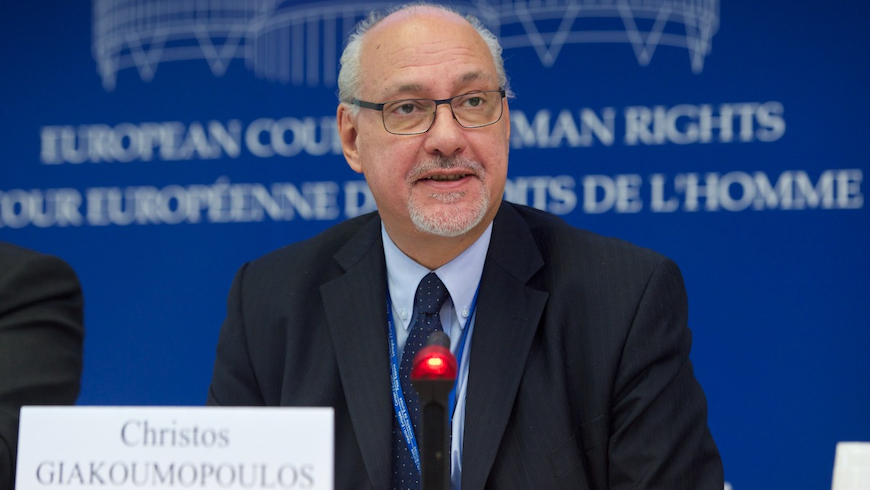Speech by Christos Giakoumopoulos
International Conference on Death Penalty, organised by the Permanent Representation of Portugal to the OSCE, as part of the Portuguese Presidency of the Council of the EU
4 May 2021, online
Dear Minister Santos Silva,
Dear Ambassador Lobo de Mesquita,
Excellencies, Ladies and Gentlemen,
First of all, let me congratulate Portugal for its pioneering role in the promotion of the abolition of the death penalty worldwide and for organising this conference. Indeed, it is important to keep this topic high on the agenda of international organisations such as those gathered here today.
The Council of Europe (CoE) and its 47 member states have created a death-penalty free zone for nearly a quarter of a century since the last execution in 1997. It is not exaggerated to say that abolition of the death penalty has become part of the European acquis. The prohibition of the death penalty has also been a precondition for membership since the 90’ and any attempt to reintroduce the death penalty would have immediate consequences on the country’s status vis-à-vis the Organisation.
How did we get there? The death-penalty free zone that is Europe today – with the exception of Belarus – looked different more than 70 years ago. At that time, the death penalty was not considered to violate international standards. However, from the late 1960s, a consensus began to emerge in Europe that the death penalty seemed to serve no purpose in a civilised society governed by the rule of law and respect for human rights. PACE played a leading role in the move towards abolition by confirming, in a momentous debate in 1980, that the death penalty is indeed inhuman.
This led to the CoE adopting in 1983 the first legally binding instrument providing for the unconditional abolition of the death penalty in peacetime: Protocol No. 6 to the ECHR. This text is currently ratified by 46 of the 47 member states. The Russian Federation is committed to ratification and, most importantly, has put in place a moratorium on death penalty.
In 2002, the CoE adopted Protocol No. 13 to the ECHR concerning the abolition of the death penalty in all circumstances, in other words also in time of war or of imminent threat of war. Reservations to and derogations from the Protocol are not possible. The Protocol entered into force on 1 July 2003. It has to date been signed and ratified by 44 member states.
The abolition of the death penalty has been achieved through a top-down approach in most CoE member states. The experience of Member States has been diverse. In some cases, abolition was undertaken with enthusiasm, in others, with indifference. In Ukraine executions were carried out until 1997, that is two
years after it joined the Council of Europe. Eventually, it was the Constitutional Court of Ukraine which abolished in practice the death penalty by declaring it unconstitutional. Even in cases where the public opinion was not clearly in favour of abolition, there were no major objections once abolition was introduced. However, we cannot let our guard down because dormant support for the death penalty may still exist and it is important to dry out from the outset the ground for populist calls for reintroduction. For this reason, abolition of the death penalty remains high on the Council of Europe’s political agenda.
Commitment to the abolition of the death penalty needs international fora, such as the present conference, and active multilateral support. For the Council of Europe, abolition does not stop at Europe’s borders. This is why Heads of State or Government called for universal abolition at the Council of Europe’s Summit held in 1997. Universal abolition can only be achieved by joining efforts with other international organisations, and this has been a key element of the Council of Europe’s strategy to outlawing this cruel punishment in the minority of countries that still retain it. The UN, the OSCE and the EU are major partners in this respect. The CoE supports the United Nations General Assembly Resolution calling for a worldwide moratorium on the use of death penalty. Also, the CoE and the EU have teamed up to encourage all countries to abolish death penalty and join the global Alliance for Torture-Free Trade. Let me also signal that the Committee of Ministers (CM) adopted recently a Recommendation on measures against the trade of goods used for the death penalty, torture and other inhuman or degrading treatment and punishment.
I will not speak about the situation of Belarus as we will discuss it thoroughly in session II. Two of the Council of Europe’s observer states maintain capital punishment: the US, which enjoys this status since 1995, and Japan, which is celebrating its 25th anniversary as an observer state. The situation in these two countries is being examined regularly by the CM and their representatives are invited to present the state of play in their respective country. If requested, the Council of Europe would gladly share its experience in abolishing the death penalty with these two countries, as well as with the neighbourhood countries, such as Morocco and Tunisia, with whom the Council of Europe entertains a special co-operation relationship as well.
Political leadership is indispensable - and sometimes sufficient - to achieve abolition, but it is important to understand which obstacles – real or pretexts - prevent abolition. Working to remove them can help build this indispensable political will.
As all studies show, the less people know about death penalty, the more they are in favour of keeping it. Studies have shown that attitudes to sentencing become less punitive when people are provided with fuller information. This is even more evident when such information is combined with dialogue. Therefore, it is important to underline the vital role of the media and the civil society in providing reliable information on the issue of capital punishment and its application so that the public becomes better informed or, to put it rightly, less misinformed.
Apart from the political institutions of the Council of Europe, the PACE and the CM, the European Court of Human Rights also plays a role in limiting the use of the death penalty outside Europe. The landmark judgment in this respect is Soering v. UK, issued in 1989, in which the Strasbourg Court considered that an extradition by the UK to the US would constitute a violation of the prohibition of torture and inhuman
and degrading treatment and punishment because the applicant would have been exposed to the phenomenon of death row. Since then, the Court has developed a rich and consistent case law directed at preventing persons being put at risk of the use of the death penalty. This case-law is followed by all CoE member states. Thus, the unfortunate existence of the death penalty prevents criminal cooperation between states: it is not possible to extradite someone in a country where he or she would face the death penalty. The European Convention on Extradition confirms this. It provides clearly that extradition may be refused if the offense for which the extradition is requested is punishable by the death penalty, unless the Requesting Party provides assurances that it will not be carried out.
Ladies and Gentlemen,
Let me conclude by saying that the arguments against the death penalty are well-known. It is cruel. Irreversible. Discriminatory. It has no restorative effect on victims of crime. It is not dissuasive. It is ineffective, incompatible with fundamental rights. Socially unnecessary and morally unacceptable. A state cannot claim to be delivering justice if it annihilates human dignity by using violence. It is indeed difficult to understand how killing the perpetrators of crimes achieves justice for both victims and the society as a whole. The goals set in the 2030 agenda would be missed if the vision of justice and rule of law that is promoted therin is not aligned with the promotion and protection of human rights and dignity of all.
The Council of Europe stands ready to share its experience to achieve abolition of the death penalty worldwide and to support the reforms of criminal justice systems that respect the rights of the victims, as well as those of the accused and the interests of the institutions and the society.
Thank you very much for your attention.




